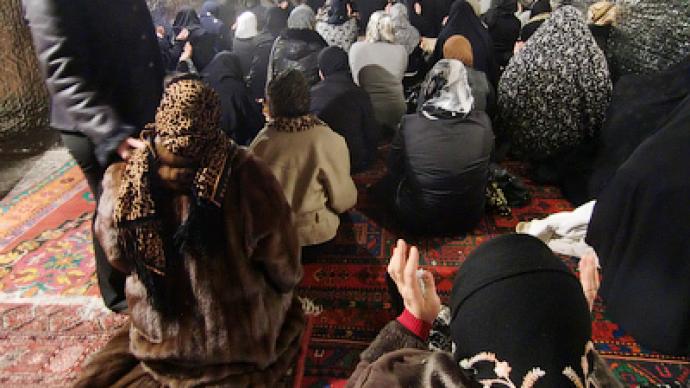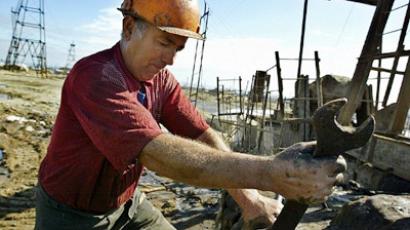The lifestyle of Iranian spies

Recent arrests of Iranian clerics and journalists in Azerbaijan have heightened tensions between the two neighbors. But with allegations of espionage downgraded to drugs and arms charges, what could the real motives for the detentions be?
Azerbaijan is a tiny republic sandwiched between Iran and Russia and washed by the world’s largest saltwater lake. Azerbaijan and Iran have been closely linked, both in terms of religion and ethnicity. Both countries have a Shiite Muslim majority. About a third of Iran’s population is made of the ethnic Azeri.While the US and Israel do not have any diplomatic relations with Iran, they do their utmost to court its neighbor. For example, the US has constantly fed Azerbaijan’s hopes for the return of the breakaway region of Nagorno-Karabakh, occupied some 20 years ago by neighboring Armenia, Iran’s most loyal ally.Azerbaijan has signed a contract with Israel on arms supplies worth US$1.6 billion and on the construction of a plant producing drones.Baku has assured Tehran that Azerbaijan will not agree to serve as a springboard for a possible US attack. But actions speak louder than words.Azerbaijan has seen a genuine spy drama unfolding this year, with over 40 people arrested within the past 12 months, including 23 arrested in the last two months. Authorities say they have detained Iranian spies, but people believe that religious leaders are being targeted.The single official comment was published by the Novosti-Azerbaijan news agency a month ago, and was voiced by an anonymous source within the security service. He told the news agency that these arrests were “aimed at destroying Iran’s tools of influence over the government and the people of Azerbaijan, which could be exploited by Tehran during a potential war against the neighboring state.”The news came after the arrests of the following people: • Anar Bayramli, 31, a Baku reporter working for the Iranian Sahar TV channel;• Ramil Dadashov, Bayramli’s driver; • Abulfa Eibatov, a correspondent for the Islam Khyagigyatlyari newspaper, living in the village of Nardaran; • Ilham Alikperov, head of the office of the Islamic Party of Azerbaijan in the country’s second-largest city of Gyandzhe; • Niyazi Kerimov, brother of Natig Kerimov, a member of the Supreme Council of the Islamic Party; • Ilham Aliyev, an employee of the mosque in the village of Binagadzhi. Journalist Bayramli, who was dubbed as a “dangerous spy”, was only charged with alleged heroin possession.Deputy Head of the Islamic Party of Azerbaijan Akif Geidarli has called the arrests “repressions against worshippers.”
‘Politically-motivated’
The Azerbaijani Intelligentsia Union has described the journalists’ arrests as a “premeditated, biased, and politically-motivated” move.Lawyer Elchin Namazov points to the mismatch between the official accusations and the evidence. He believes that this hunt is after the dissidents. They are accused of hostile actions, but jailed for drugs and arms possession, he says.DEVAMM, the Centre for the Protection of Freedom of Conscience and Religion, considers all those arrested to be prisoners of conscience. DEVAMM’s leading coordinator, Ilgar Ibrahimoglu, said that his group has been receiving inquiries over the arrests by the Council of Europe and the UN every day.Meanwhile, at a meeting with journalists, US Charge d'Affaires in Azerbaijan Adam Sterling welcomed the efforts of the security services – even though the investigation has yet to be carried out. "We understand from public information that the people were arrested, who were involved in cooperating with dangerous plan, and we are very happy that the security forces have stopped these actions," Sterling said.Ariel Cohen, a senior research fellow at the Heritage Foundation, seems to have more information about the spies’ crimes than the investigators do. In his article for The National Interest, he writes that there were three groups of Iranian agents “planning terrorist attacks against American businesses, Western oil companies, Israeli diplomats and prominent members of the Jewish community.” He is also aware that this was a “network of 22 Iranian agents trained by the Iranian Revolutionary Guard Corps.” The arrests began a year ago after the leader of the Islamic Party of Azerbaijan, Movsum Samedov, condemned the government ban on hijabs in schools and spoke out against corruption and human rights violations in the country. As a result, in the autumn of 2011, Samedov, along with six other devout Muslims, was convicted of attempting to overthrow the government, plotting terrorist acts and illegal arms possession. They were given lengthy prison sentences.
Seaside spy breeding ground
I set out for the nest of spies, the settlement of Nardaran. Fourteen of the 23 men arrested come from this seaside village, half an hour’s drive from capital Baku.Nardaran has a controversial reputation. For some, it is the spiritual center of Azerbaijan, home to ancient shrines. For others, it is a rebellious settlement living in defiance of Baku. It is also an upscale seaside resort, with villas of the Azeri establishment strewn around the place.Surprisingly enough, none of the people residing in what has been dubbed as a “nest of spies” and the “antigovernment center” have ever called for violent action against the residents of the government villas. The country’s elite does not want to give up enjoyable vacations here, either, and continue to come over and visit its shrines in secret.I meet Natig Kerimov, head of Nardaran, an elder and a member of the Supreme Council of the Islamic Party of Azerbaijan. He walks with a stick and has still retained his sense of humor. The only portrait in his house with a veneer ceiling belongs to Imam Khomeini. The Khomeinists movement emerged some 30 years ago around these places, when it was still part of the Soviet Union. It sprang up after the Iranian Islamic Revolution in 1979, and since then the name Khomeinists has been given to any devout Muslim. And while over the time their numbers have multiplied, revolutions have spread across the Islamic world, persecution has grown too.Natig Kerimov has frequently visited Iran, met both with Ayatolla Khomeini and Ayatolla Khamenei. The fences in the settlement carry the “Allahu Akbar” slogan in Arabic.“They paint over these words elsewhere in Azerbaijan, but here you can see them on every fence. Politicians in Baku say Nardaran is ruled by Iran.” Natig straightened out his back, stirred his tea in a nice-looking mug and looked at his grandson, who kept quiet during several hours of our conversation.
Ancient Muslim community
Nardaran people like do not like to be called a town or a settlement, instead they say they are a community. “We have 9,000 people in our community. Azerbaijan’s population is 9 million. Allah works to keep this proportion.”If you drive through the community in a car, you are bound to see signs leading you to a mosque. Pilgrims from all over the country flock to this revered place of worship for Muslims.The old tiny building has been preserved, with a new larger mosque, boasting two inner courtyards and arcades rising above it.Nearby stands the centuries-old cemetery. Once, during construction works, the diggers stumbled on a terrible Middle-Ages grave – 10 rows of dead bodies, all with their skulls pierced by a metal rod.“The elders wrote a letter to the Iranian city of Qom asking whether they were allowed to open the grave. Once they had permission, they re-buried all of them,” explain the elders, solemnly sitting at the table and joining the discussion in turns.In February, Natig’s brother was arrested. “The arrests started since February 10. Just two days ago they locked up a student who had studied in Syria. They nicked him right with his turban on.”He then goes on to name those arrested:• Haji Nusret, 36, studied in Syria;• Ali Khuseinov, 55, taught 300 people to read the Koran; • Elchin Kuliev, 44, businessman, did a lot of charitable work, visited Mecca. He had 53 grams of heroin planted on him;• Niyazi Kerimov, born in 1951. He was a volunteer during the 1990s Nagorno-Karabakh war between Armenia and Azerbaijan, in his childhood he was friends with the current Azeri president;• Halidogha Alikperov, 37, joined the Nagorno-Karabakh war at the age of 14, was invalided at 18, and now he is accused of treason. He is married with three children;• Imran Alikperov, 42, married with three children. He had drugs planted during the arrest; • Dilaver Yakhibekov, 48, married with five children, grew flowers and tomatoes for sale, had drugs planted on him. There were arrests in other settlements, too. “In the village of Bina, Mullah Ilham Aliyev was invited to lead a wedding ceremony. He is married with two children. He studied in Qom for 18 years. He was handcuffed in the middle of the wedding. They said they found a revolver on him – can you imagine a mullah bringing a revolver over to the wedding?”Natig Kerimov names those who went to study in Qom and are now reluctant to return for fear of arrest.Almost a quarter of a century ago Nardaran became the birthplace of the Islamic Party. But it has never been registered. Its leader, Movsum Samedov, a qualified doctor from the village of Kuba, was jailed for 12 years last year. He has been in prison for a year now.“His deputy was arrested, too. He got away with a 10-year sentence. They seize educated people, those who can preach, mullahs who have been teaching the Koran for 30 years. How would they manage to convict them with evidence like this? One imam, for example, was arrested for allegedly selling drugs during Friday prayers.”The elder explains that the all the guns found by the police as evidence have their serial numbers removed. People in the community believe it is simply one and the same firearm. “First an elderly woman found a sack in the manure, in the cowshed. We pulled it out to find a gun inside. That was when it all started. They showed a report on TV, a young man in handcuffs, and the narrator saying that he is accused of arms possession. And they show exactly the same gun that we found in the cowshed.“Once they came to detain a man named Rokhulla. He has some 12 children, all minors. The police officers were not embarrassed to talk about their mission in front of other community members. They discussed between each other that it would be too difficult to order all the children to lie down, because children would hardly obey it, so they said it would be better to go to a different house.“So they went to Rokhulla’s neighbor, and there they found a sack with a gun. However, later it turned out that the home owner had long moved to Russia,” Natig relates.
Targeted for 12 years
Arrests began in 2000. Natig says he recalls an army of 5,000 solders moving in to occupy Nardaran. “Eight of our elders were put in prison for nine months. 17 people were wounded. We had protests 160 times. 60 countries rose up in our support. We do not have weapons, so we cannot fight them. That’s why they say that Nardaran is not controlled by Baku but is run from Qom.” Natig was arrested himself. In 2003, he spent three months in detention and was eventually handed down a five-year suspended sentence. “They told the court I threw a stone at the police, but said I was lucky to have missed.”He has been arrested several times since then, but police officers are too ashamed to keep the sick man behind bars and they let him out at night. I ask him whether they have detained any women. His brows rise halfway up his forehead. “Women? No, they have not lapsed to that kind of humiliation.”Asked about a possible war against Iran by the West, he said, “Iran has disclosed all of its secrets, but it’s not good enough for them. Well, Iran has a master. If you want to go against him, you’ll have to deal with Allah. In 1980, the Americans wanted to destroy Iran, too. They attacked, but the sand rose up and made them leave.”Kerimov refers to the botched US operation to release American hostages, ordered by President Carter. The mission failed when the helicopters were caught a sandstorm.Then I ask him to confirm or deny the recent media reports that the Azeri minority in Iran is planning to overthrow the regime of the ayatollahs, that an uprising is brewing in the military. He, too, read the news that there have been clashes between army units comprised of different ethnicities in the city of Tebriz.“I called up my friends working at the Tebriz bazaar. The bazaar is the heart of the city, the people who work there know everything. So they asked me if I was crazy because in Iran there is no division of army units by ethnic groups.” Natig reminds me that Iran’s spiritual leader Khamenei is an ethnic Azeri. “The Azeri have traditionally been distinguished by their courage and piety in the Iranian army. I am a Muslim, and I don’t think in terms of nationalities.”The community has been able to keep some of its traditional ways but lost the battle in others. For instance, they had to put up with the ban on the hijab and sex segregation in schools. At the same time, they have their own ban on alcohol and they do not have to lock their doors – there are no thieves in the community. Nardaran’s flag has been cast in iron. “It will now be impossible to tear, burn or trample it.”
Nadezhda Kevorkova, RT
Disclaimer: The views and opinions expressed in the story are solely those of the author and do not necessarily represent those of RT.














